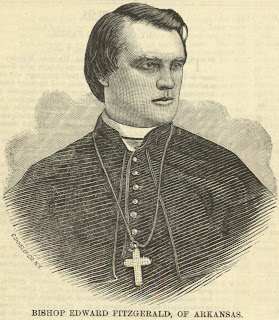Born in Ireland, Edward Mary Fitzgerald came to America as a teenager. At seventeen he began studies for the priesthood, and was ordained for the Diocese of Cincinnati in 1857. For the next nine years, he served as a pastor in Columbus. In 1866, he was named Bishop of Little Rock, a diocese encompassing the entire state of Arkansas. He initially refused, but reconsidered and accepted the appointment. At thirty-three, he was the world’s youngest bishop.
When Bishop Fitzgerald came to Arkansas, Catholics composed less than one percent of the state’s white population. The next five decades saw significant Catholic growth, as a sizeable network of parishes, schools and hospitals was developed. The number of priests doubled, and by the turn of the century 150 sisters were working in the diocese, while twenty-five men were studying for the priesthood. At the time of Fitzgerald’s death, one observer commented:
The times have grown propitious and the new era of Catholic work which has dawned upon Arkansas is pregnant with great events. The prosperous times’ increasing Catholic population, solid foundations of churches, schools and universal freedom from debt, must be a gratifying prospect to the new prelate.
In July 1870, at the First Vatican Council in Rome, the bishop “became a footnote in the history of Catholicism” when he voted against the declaration of papal infallibility. He was one of two prelates to do so (the other was a Sicilian bishop). No bishop denied the pope’s infallibility in matters of faith and morals, but several felt that the time wasn’t right for a formal declaration. (Hence they were known as the “inopportunes.”) They believed that it would present the Church too negatively to the modern world.
Fitzgerald was one of nineteen prelates who expressed their doubts collectively in writing, but he was the only one to actually vote against the declaration. He had two main concerns: that it would hinder evangelization efforts, and that it would lead to an anti-Catholic backlash. As one historian notes, the bishop lived “in a part of the world very different than Catholic Rome.” (Historians have termed this episode “the Big Rock versus the Little Rock.”) When the final vote was over, however, he immediately submitted to the council’s decision, and he presented himself to the pope with the words, “Holy Father, now I believe.”












